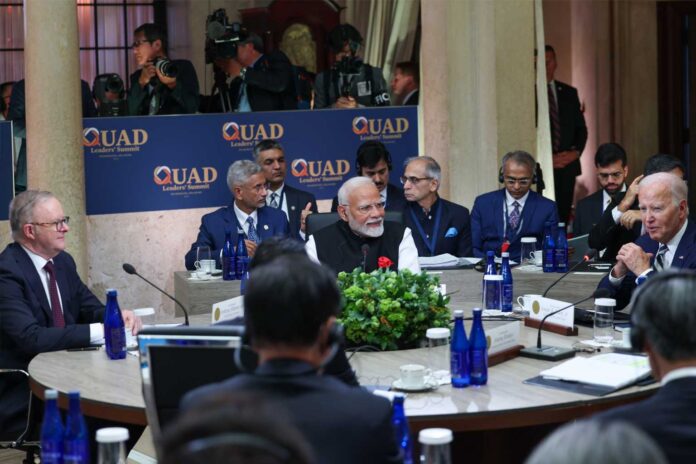Prime Minister Narendra Modi underscored India’s unwavering commitment to the “global good” during the Quad Summit 2024 in Wilmington, Delaware, hosted by US President Joe Biden. Modi’s participation, alongside Australian Prime Minister Anthony Albanese and Japanese Prime Minister Fumio Kishida, showcased India’s proactive role in addressing critical global issues such as regional security, technological advancement, and cancer research.
Modi’s vision of the Quad’s role
In his statement at the summit, Modi emphasized that the Quad has emerged as a powerful platform for advancing peace, progress, and prosperity, particularly in the Indo-Pacific region. He reiterated India’s dedication to upholding the forum’s goals, which extend beyond regional security concerns. “The Quad is not merely an alliance of nations but a commitment to the global good. We are here not just for regional peace, but for humanity’s progress,” Modi stated, highlighting India’s growing influence on global governance.
Modi’s vision for the Quad aligns with his broader foreign policy objectives, which seek to position India as a pivotal player in shaping the international order. His focus on multilateralism, sustainable development, and technological innovation was evident throughout the discussions.
Biden-Modi bilateral talks
A significant feature of the summit was the bilateral meeting between Modi and Biden. The US President praised the growing strength of India-US ties, calling the relationship “stronger, closer, and more dynamic than ever.” The talks focused on expanding bilateral cooperation across sectors like defense, technology, and climate change. Biden’s “Cancer Moonshot” initiative also became a key area of collaboration, with Modi committing India’s resources and expertise to address cancer’s global impact.
“The United States’ partnership with India is stronger, closer, and more dynamic than at any time in history,” Biden said after the talks. He praised Modi’s leadership and the transformative potential of the bilateral relationship in addressing some of the world’s most pressing challenges.
Key takeaways: Cancer moonshot and security initiatives
One of the summit’s major announcements was the launch of a landmark initiative to fight cancer. This project builds on Biden’s Cancer Moonshot, an initiative aimed at reducing cancer mortality rates globally. The Quad countries committed to jointly developing technologies and infrastructure to improve cancer detection, treatment, and research. This move aligns with the broader goal of leveraging the Quad’s collective expertise for humanitarian causes, reflecting Modi’s vision of global good.
Another critical focus of the summit was security in the Indo-Pacific, a region increasingly seen as the epicenter of geopolitical competition. The Quad reaffirmed its commitment to a free, open, and inclusive Indo-Pacific, with leaders expressing concerns over China’s growing influence in the region. The leaders also discussed maritime security, joint military exercises, and intelligence-sharing mechanisms to counterbalance regional threats.
The Ukraine war and the Israel-Gaza conflict also surfaced during discussions, with the Quad leaders agreeing on the importance of finding peaceful solutions to these crises. Modi’s recent diplomatic outreach to Kyiv positioned India as a potential mediator in the conflict, a role Biden and other Quad leaders welcomed.
Climate change and technological innovation
Climate change was another key agenda item at the summit. The Quad leaders announced several initiatives aimed at promoting clean energy, sustainable development, and disaster resilience. India, as a key driver of global renewable energy efforts, committed to expanding its solar energy capacity and reducing carbon emissions. Modi stressed the importance of developed countries providing technology and funding to help developing nations combat climate change.
In the technology sector, the Quad leaders discussed enhancing cooperation in emerging technologies such as artificial intelligence (AI), quantum computing, and cybersecurity. The forum also explored ways to counter the dominance of China in critical tech supply chains, including semiconductors and rare earth minerals. Modi called for greater collaboration between the Quad countries in setting global standards for these new technologies.
Strengthening the Indo-Pacific strategy
A recurring theme throughout the summit was the strengthening of the Indo-Pacific strategy. The Quad leaders reaffirmed their shared commitment to maintaining a rules-based international order in the region. This includes countering China’s growing assertiveness, particularly in the South China Sea, where Beijing’s aggressive territorial claims have raised tensions with neighboring countries.
Australia and Japan also highlighted their concerns over regional security, with Prime Minister Albanese and Prime Minister Kishida stressing the importance of the Quad in ensuring a stable Indo-Pacific. Kishida expressed Japan’s readiness to enhance its security ties with the Quad, particularly through joint naval exercises and intelligence-sharing agreements.
A stronger, united Quad
The Quad Summit 2024 was a reaffirmation of the forum’s commitment to fostering cooperation in the Indo-Pacific and addressing global challenges. Prime Minister Modi’s emphasis on the “global good” resonated throughout the discussions, as the leaders focused on enhancing security, technological collaboration, and humanitarian efforts.
Modi’s meeting with Biden further cemented the India-US partnership, while the broader Quad initiatives, including the fight against cancer and climate change, underscored the collective resolve of these nations to work together for a better, more secure world. The summit’s outcomes reflect the Quad’s growing significance as a global force for peace, prosperity, and strategic stability in an increasingly complex international environment.










